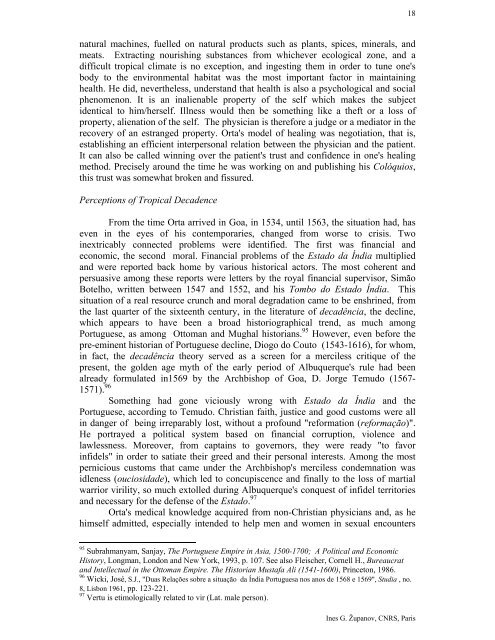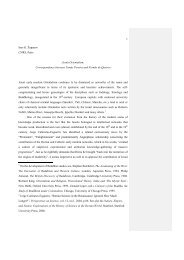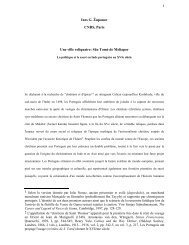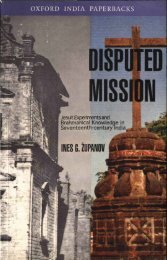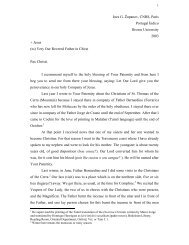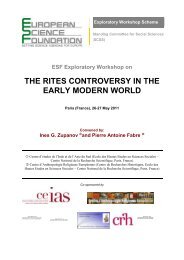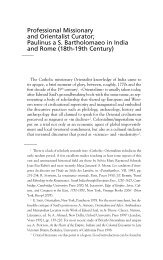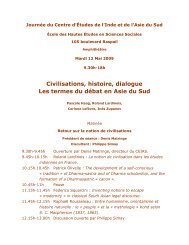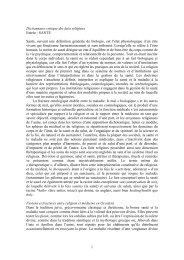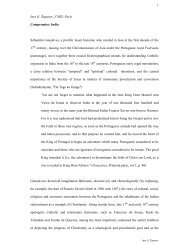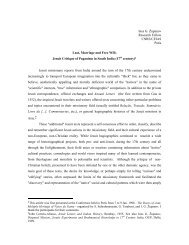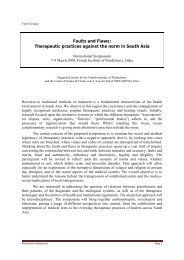Drugs, Health, Bodies and Souls in the Tropics ... - Ines G. Županov
Drugs, Health, Bodies and Souls in the Tropics ... - Ines G. Županov
Drugs, Health, Bodies and Souls in the Tropics ... - Ines G. Županov
Create successful ePaper yourself
Turn your PDF publications into a flip-book with our unique Google optimized e-Paper software.
18<br />
natural mach<strong>in</strong>es, fuelled on natural products such as plants, spices, m<strong>in</strong>erals, <strong>and</strong><br />
meats. Extract<strong>in</strong>g nourish<strong>in</strong>g substances from whichever ecological zone, <strong>and</strong> a<br />
difficult tropical climate is no exception, <strong>and</strong> <strong>in</strong>gest<strong>in</strong>g <strong>the</strong>m <strong>in</strong> order to tune one's<br />
body to <strong>the</strong> environmental habitat was <strong>the</strong> most important factor <strong>in</strong> ma<strong>in</strong>ta<strong>in</strong><strong>in</strong>g<br />
health. He did, never<strong>the</strong>less, underst<strong>and</strong> that health is also a psychological <strong>and</strong> social<br />
phenomenon. It is an <strong>in</strong>alienable property of <strong>the</strong> self which makes <strong>the</strong> subject<br />
identical to him/herself. Illness would <strong>the</strong>n be someth<strong>in</strong>g like a <strong>the</strong>ft or a loss of<br />
property, alienation of <strong>the</strong> self. The physician is <strong>the</strong>refore a judge or a mediator <strong>in</strong> <strong>the</strong><br />
recovery of an estranged property. Orta's model of heal<strong>in</strong>g was negotiation, that is,<br />
establish<strong>in</strong>g an efficient <strong>in</strong>terpersonal relation between <strong>the</strong> physician <strong>and</strong> <strong>the</strong> patient.<br />
It can also be called w<strong>in</strong>n<strong>in</strong>g over <strong>the</strong> patient's trust <strong>and</strong> confidence <strong>in</strong> one's heal<strong>in</strong>g<br />
method. Precisely around <strong>the</strong> time he was work<strong>in</strong>g on <strong>and</strong> publish<strong>in</strong>g his Colóquios,<br />
this trust was somewhat broken <strong>and</strong> fissured.<br />
Perceptions of Tropical Decadence<br />
From <strong>the</strong> time Orta arrived <strong>in</strong> Goa, <strong>in</strong> 1534, until 1563, <strong>the</strong> situation had, has<br />
even <strong>in</strong> <strong>the</strong> eyes of his contemporaries, changed from worse to crisis. Two<br />
<strong>in</strong>extricably connected problems were identified. The first was f<strong>in</strong>ancial <strong>and</strong><br />
economic, <strong>the</strong> second moral. F<strong>in</strong>ancial problems of <strong>the</strong> Estado da Índia multiplied<br />
<strong>and</strong> were reported back home by various historical actors. The most coherent <strong>and</strong><br />
persuasive among <strong>the</strong>se reports were letters by <strong>the</strong> royal f<strong>in</strong>ancial supervisor, Simão<br />
Botelho, written between 1547 <strong>and</strong> 1552, <strong>and</strong> his Tombo do Estado Índia. This<br />
situation of a real resource crunch <strong>and</strong> moral degradation came to be enshr<strong>in</strong>ed, from<br />
<strong>the</strong> last quarter of <strong>the</strong> sixteenth century, <strong>in</strong> <strong>the</strong> literature of decadência, <strong>the</strong> decl<strong>in</strong>e,<br />
which appears to have been a broad historiographical trend, as much among<br />
Portuguese, as among Ottoman <strong>and</strong> Mughal historians. 95 However, even before <strong>the</strong><br />
pre-em<strong>in</strong>ent historian of Portuguese decl<strong>in</strong>e, Diogo do Couto (1543-1616), for whom,<br />
<strong>in</strong> fact, <strong>the</strong> decadência <strong>the</strong>ory served as a screen for a merciless critique of <strong>the</strong><br />
present, <strong>the</strong> golden age myth of <strong>the</strong> early period of Albuquerque's rule had been<br />
already formulated <strong>in</strong>1569 by <strong>the</strong> Archbishop of Goa, D. Jorge Temudo (1567-<br />
1571). 96 Someth<strong>in</strong>g had gone viciously wrong with Estado da Índia <strong>and</strong> <strong>the</strong><br />
Portuguese, accord<strong>in</strong>g to Temudo. Christian faith, justice <strong>and</strong> good customs were all<br />
<strong>in</strong> danger of be<strong>in</strong>g irreparably lost, without a profound "reformation (reformação)".<br />
He portrayed a political system based on f<strong>in</strong>ancial corruption, violence <strong>and</strong><br />
lawlessness. Moreover, from capta<strong>in</strong>s to governors, <strong>the</strong>y were ready "to favor<br />
<strong>in</strong>fidels" <strong>in</strong> order to satiate <strong>the</strong>ir greed <strong>and</strong> <strong>the</strong>ir personal <strong>in</strong>terests. Among <strong>the</strong> most<br />
pernicious customs that came under <strong>the</strong> Archbishop's merciless condemnation was<br />
idleness (ouciosidade), which led to concupiscence <strong>and</strong> f<strong>in</strong>ally to <strong>the</strong> loss of martial<br />
warrior virility, so much extolled dur<strong>in</strong>g Albuquerque's conquest of <strong>in</strong>fidel territories<br />
<strong>and</strong> necessary for <strong>the</strong> defense of <strong>the</strong> Estado. 97<br />
Orta's medical knowledge acquired from non-Christian physicians <strong>and</strong>, as he<br />
himself admitted, especially <strong>in</strong>tended to help men <strong>and</strong> women <strong>in</strong> sexual encounters<br />
95 Subrahmanyam, Sanjay, The Portuguese Empire <strong>in</strong> Asia, 1500-1700; A Political <strong>and</strong> Economic<br />
History, Longman, London <strong>and</strong> New York, 1993, p. 107. See also Fleischer, Cornell H., Bureaucrat<br />
<strong>and</strong> Intellectual <strong>in</strong> <strong>the</strong> Ottoman Empire. The Historian Mustafa Ali (1541-1600), Pr<strong>in</strong>ceton, 1986.<br />
96 Wicki, José, S.J., "Duas Relações sobre a situação da Índia Portuguesa nos anos de 1568 e 1569", Studia , no.<br />
8, Lisbon 1961, pp. 123-221.<br />
97 Vertu is etimologically related to vir (Lat. male person).<br />
<strong>Ines</strong> G. <strong>Županov</strong>, CNRS, Paris


